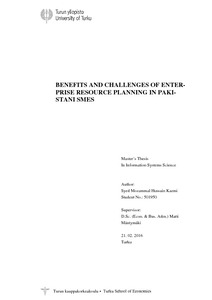Benefits and challenges of Enterprise Resource Planning for Pakistani SMEs
Kazmi, Syed (2018-01-03)
Benefits and challenges of Enterprise Resource Planning for Pakistani SMEs
Kazmi, Syed
(03.01.2018)
Turun yliopisto
avoin
Julkaisun pysyvä osoite on:
https://urn.fi/URN:NBN:fi-fe201801031043
https://urn.fi/URN:NBN:fi-fe201801031043
Tiivistelmä
Enterprise resource planning (ERP) software is used to combine all the functions happening inside the organization with the help of one software. All the data is centralized which makes it easy to manage information for all participants. The literature on ERP is studied thoroughly the whole process of adoption till the implementation and final evaluations. But studies that focus on small and medium sized enterprises are limited in number when compared to the large scale enterprises. In case of Pakistan, research is very limited.
In this thesis, the author tries to analyze the current status of SMEs usage of ERP system. The benefits obtained and challenges faced by SMEs of Pakistan are studied. Framework presented by Shang and Seddon (2000) is used to understand the benefits obtained by the SMEs in Pakistan. This is a comprehensive framework that classifies the benefits obtained by the ERP adoption, into five categories: operational benefits, managerial benefits, Strategic benefits, IT benefits, and Organizational benefits.
The results show that SMEs of Pakistan are also getting many benefits after adoption of ERP. Most of the firms had implemented SAP software. Operational benefits were mentioned by all the firms. The most important benefits were report generation, quick access to critical information, better product and cost planning. Respondents also mentioned that they had reduced corruption as a result of ERP implementation. It is also an important benefit considering high corruption rate in Pakistan.
Along with benefits, challenges faced by Pakistani SMEs included infrastructure problems like electricity, difficulties with integration of one module with other module, costs of adoption and lack of skilled ERP consultants. Further studies in this regard can be conducted on cloud based ERP which is fast growing all around the world.
In this thesis, the author tries to analyze the current status of SMEs usage of ERP system. The benefits obtained and challenges faced by SMEs of Pakistan are studied. Framework presented by Shang and Seddon (2000) is used to understand the benefits obtained by the SMEs in Pakistan. This is a comprehensive framework that classifies the benefits obtained by the ERP adoption, into five categories: operational benefits, managerial benefits, Strategic benefits, IT benefits, and Organizational benefits.
The results show that SMEs of Pakistan are also getting many benefits after adoption of ERP. Most of the firms had implemented SAP software. Operational benefits were mentioned by all the firms. The most important benefits were report generation, quick access to critical information, better product and cost planning. Respondents also mentioned that they had reduced corruption as a result of ERP implementation. It is also an important benefit considering high corruption rate in Pakistan.
Along with benefits, challenges faced by Pakistani SMEs included infrastructure problems like electricity, difficulties with integration of one module with other module, costs of adoption and lack of skilled ERP consultants. Further studies in this regard can be conducted on cloud based ERP which is fast growing all around the world.
